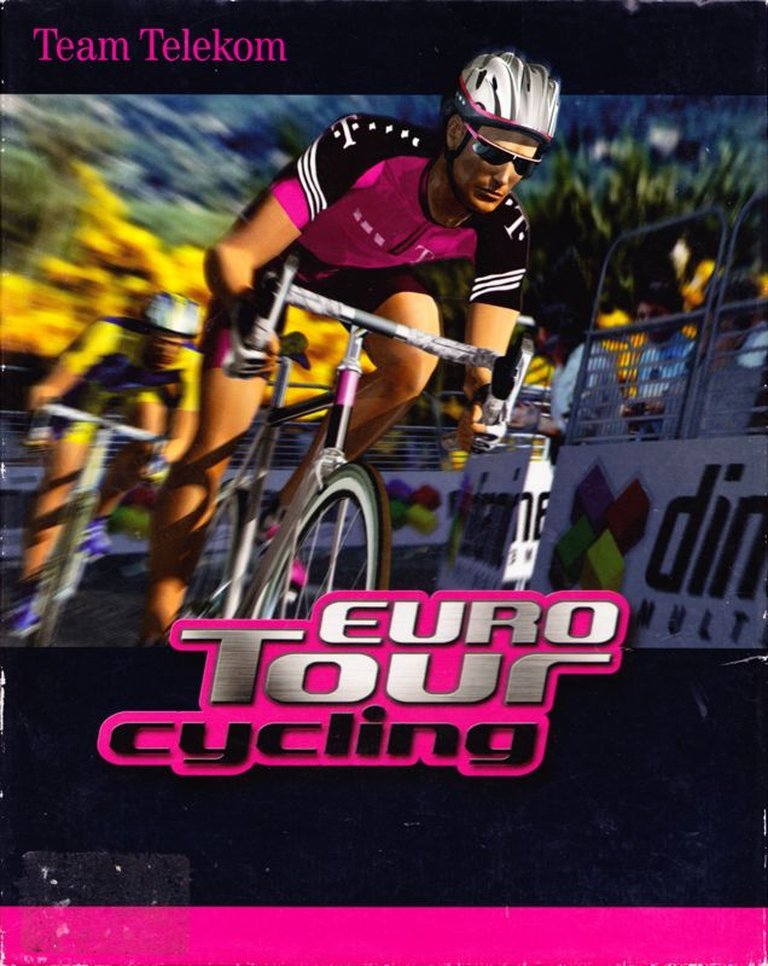- Release Year: 2001
- Platforms: Windows
- Publisher: Dinamic Multimedia, S.A.
- Developer: Dinamic Multimedia, S.A.
- Genre: Simulation, Sports
- Perspective: 1st-person
- Game Mode: Single-player
- Gameplay: Bicycling, Bike, Managerial simulation, Vehicular
- Setting: Sports
- Average Score: 74/100

Description
Eurotour Cycling is a cycling management simulation game where players are responsible for the athletic success of their team, with options for training and tactics, and real-time 3D racing. The game has two modes: a management mode for one season and a racing mode for a single major race without management options.
Patches & Updates
Reviews & Reception
forum.cyclingnews.com : it’s absolute addictive game although old and not good looking by todays standards, it is extremely realistic and real time!!
Eurotour Cycling: Review
Introduction
Eurotour Cycling, a cycling management simulation game developed and published by Dinamic Multimedia, S.A., was released in 2001 for Windows. At its core, Eurotour Cycling challenges players to manage a cycling team, making strategic decisions on training, tactics, and rider management throughout a single season. Despite its age, the game still garners interest from cycling enthusiasts and retro gaming communities due to its depth and realism. This review aims to dissect the game’s development history, narrative, gameplay mechanics, world-building, reception, and legacy, providing a comprehensive analysis of its place in video game history.
Development History & Context
Eurotour Cycling was developed by Dinamic Multimedia, S.A., a studio known for producing sports management games, particularly in the realm of football (soccer) with their “PC Fútbol” series. The development team consisted of 28 credited individuals, including producers, programmers, researchers, testers, and graphic designers. The game was released in 2001, a time when sports management simulations were gaining popularity, and cycling games were relatively niche.
The technological constraints of the era influenced the game’s design, with 3D graphics being a significant feature, albeit with some limitations. The game’s engine and graphical capabilities were reflective of the early 2000s PC gaming landscape, with real-time 3D rendering being a notable aspect.
Narrative & Thematic Deep Dive
Eurotour Cycling does not have a traditional narrative in the sense of a story-driven game. Instead, the “narrative” is derived from the player’s experience managing their cycling team through a season. The game is structured around managerial decisions, team management, and tactical choices during races. The absence of real rider names (though some are accurate, and team logos and shirts are licensed) adds a layer of realism and challenge, as players must manage their teams with fictionalized names.
The underlying themes revolve around strategy, leadership, and the intricacies of professional cycling. Players must balance short-term goals, such as winning specific races, with long-term strategies, like developing riders and planning for future seasons.
Gameplay Mechanics & Systems
The gameplay is divided into two primary modes: a managerial mode where players oversee their team’s training, tactics, and participation in races, and a racing mode where they directly influence the tactics during the races. The managerial aspect involves making decisions on training plans, nutrition, and team dynamics, which affect the riders’ performance.
During races, players can issue nine different commands to their riders to influence the outcome, adding a layer of tactical depth. The 3D presentation of races, with the ability to skip through less exciting sections via a time-lapse feature, enhances the experience.
However, critics noted that the managerial aspects were somewhat simplistic and lacking in depth compared to other management simulations. The user interface, likened to an Excel spreadsheet by some critics, was also a point of contention.
World-Building, Art & Sound
The game’s world is centered around professional cycling, with a focus on realism and authenticity. The inclusion of real team logos and shirts, despite the use of fictionalized rider names, contributes to the game’s immersive atmosphere.
Graphically, the game was average for its time, with 3D race scenes being a highlight. The sound design, while not extensively praised, played a role in creating an immersive experience, especially during races.
Reception & Legacy
Eurotour Cycling received mixed reviews upon its release, with an average critic score of 45% based on four ratings on MobyGames. Critics praised the 3D race visuals and the game’s realism but criticized the simplistic management mechanics and the user interface.
Despite its initial reception, Eurotour Cycling has maintained a dedicated following, particularly among cycling enthusiasts. The game’s depth and realism have allowed it to remain relevant, with community-created patches and updates extending its lifespan.
The game’s influence can be seen in later cycling management simulations, such as the “Pro Cycling Manager” series, which built upon the foundations laid by Eurotour Cycling and similar titles.
Conclusion
Eurotour Cycling is a niche yet significant title in the history of sports management simulations and cycling games. While it may not have stood out visually or mechanically compared to some of its contemporaries, its depth and focus on realism have earned it a dedicated following. The game’s legacy is evident in its continued popularity among cycling enthusiasts and its influence on later cycling management games.
In conclusion, Eurotour Cycling remains an important title for those interested in the evolution of sports management games and cycling simulations. Its blend of managerial depth and realistic racing mechanics, despite some flaws, has secured its place in the annals of video game history.